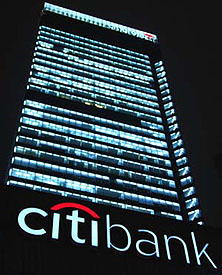Last night I made the argument that focusing on crude firm size wasn’t the right way to look at our current banking crisis. It’s the overall industry size that’s important, not the size of individual banks.
 But if you disagree, James Kwak makes about the best case for the prosecution that I’ve seen yet, suggesting that a financial industry with lots of midsize companies would work just fine:
But if you disagree, James Kwak makes about the best case for the prosecution that I’ve seen yet, suggesting that a financial industry with lots of midsize companies would work just fine:
What would such a world look like? There would be a lot of small- and medium-sized banks that collected deposits and lent money to households and businesses. There would be brokerage and asset management firms that you used to invest your savings. There would be hedge funds and private equity firms that rich people and other institutional investors used to invest their money. There would be investment banks that helped companies issue equity and debt securities. There would be boutique firms that did research and other boutiques that M&A advising. For any financial service anyone wanted, there would be a company that provided that service; it just wouldn’t necessarily provide every other service, and it wouldn’t have $2 trillion in assets. It would look something like the 1970s.
What’s wrong with this picture? Some people would argue that it would limit financial innovation….Some would argue that costs would be higher, because smaller firms would be less able to capture economies of scale and scope….To some people, the idea of size caps will seem anti-capitalist (or even un-American)….
Kwak addresses all of these issues fairly persuasively. But to me it still has the flavor of a solution that’s clear, simple, and wrong. After all, Bear Stearns was a quarter the size of Citigroup, and it was considered too big to fail. So just what would the limit be on bank size? $500 billion in assets? $200 billion? Can a country the size of the United States even have nationwide banks with limits like that? And what happens the next time around, when all these smallish banks overleverage themselves and collapse en masse? Are we any better off than we are with a few big banks failing?
The whole post is worth reading, but I have a feeling that nostalgia for the 70s just isn’t going to work. Big companies are here to stay, and I suspect that any regulation stringent enough to keep banks small enough to fail won’t be sustainable. And unless we reign in overleverage and massive waves of credit expansion, it won’t do any good anyway. The same thing will happen again, just in a slightly different way.













